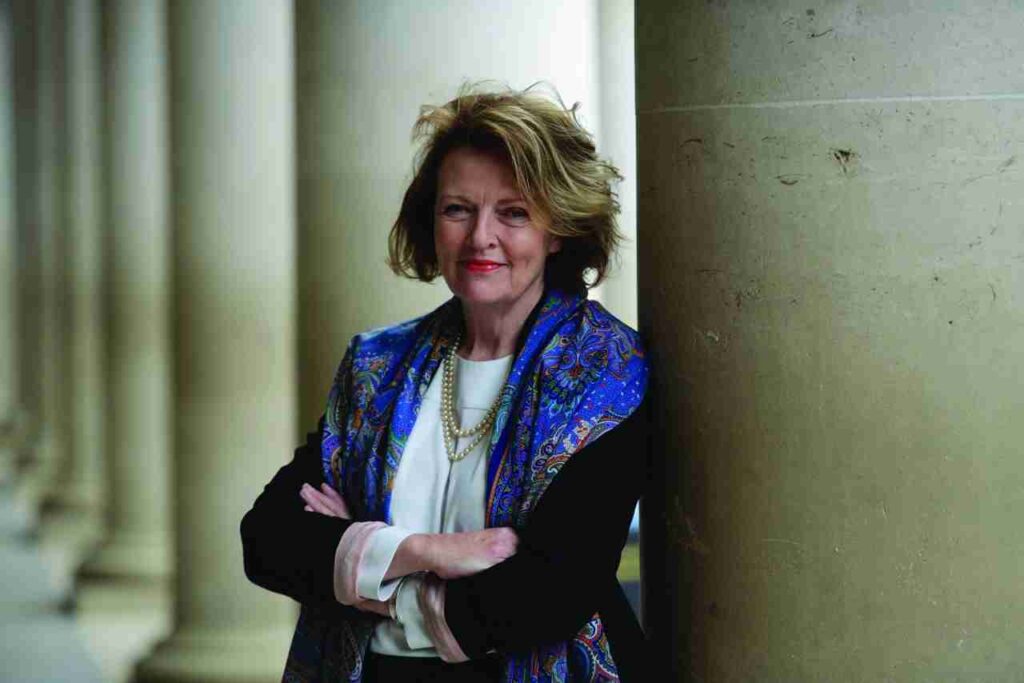How can schools design a joyful and challenging English curriculum which seeks to elevate and invest in teacher autonomy? Education expert Mary Myatt shares her practical thoughts and ideas.
It was a pleasure to chat to education adviser, writer and speaker Mary Myatt about her insightful thoughts on an equitable English curriculum and investment in teacher professional development. I have always been drawn to Mary’s work due to her commitment to encouraging educators to continue to be curious and the fact that we have a shared belief in the importance of bringing learning experiences to life. Our discussion included thoughts around challenging, high-quality and joyful curriculum design and the role of teacher autonomy (and the responsibility of leaders) in curating opportunities for its development and implementation.

Education advisor, writer and speaker
Why considered curriculum design matters
Laura:
Hi Mary, thank you so much for coming along to join me today to discuss all things English curriculum and empowering teachers in their professional development. I’m looking forward to asking you a couple of questions and seeing where the discussion takes us. Firstly, I wanted to get your thoughts on how important you deem autonomous and creative curriculum design to be.
Mary:
It’s lovely to join you for this, Laura. I think there’s been a tendency in some parts of the sector, for good reasons, to try and do things to improve the thinking around workload and also thinking about how we make sure our pupils got an entitlement across our schools, in whatever context. So, what has happened in order to try to do that, both lighten teachers’ workload and make sure there’s a degree of equity in terms of provision for our young people, has been the development of centralised resources, underpinning lessons and the curriculum. Now, I think these can be a good thing up to a point.
I think they’re a good thing on two counts. One is I don’t think that teachers should be in the position of having to create everything from scratch. And I think school leaders need to know that pupils have got the appropriate level of challenge in terms of the resources and texts that they’re offered.
So, I think there needs to be that overview and support for teachers but what can happen is that those centrally generated resources, either a scheme that’s been brought in or the ones that have been developed through a Multi Academy Trust, sometimes those are interpreted as though they they’re the only thing, they’re the only way to teach, instead of them being principles. Then teachers are expected to follow them to the letter and click and play through the slides.
I think this is both demoralising for the profession, where that’s an expectation, and also doesn’t really bring the curriculum to life. I think a way of encouraging people to think about this is,
“I’ve got an obligation as a teacher to do the intellectual preparation for my lessons and therefore I want to be able to consider those resources and think how I’m going to unpack them for the children in front of me.” Then you’ve got that balance, it seems to me.

The role of senior leaders
Laura:
I love the comment there about ‘intellectual preparation’. This is so important. Which leads me on nicely to our next discussion point – the role of senior leaders and their commitment to recognising, supporting and encouraging staff’s continued professional learning. I know that we’re both really passionate about the curriculum being joyful for teachers and pupils, alongside this being meaningful and challenging. So, what do you think the role of senior leaders is in actually creating this ethos and these opportunities for teachers?
Mary:
Senior leaders need to know that there’s a high-quality curriculum in place for all their pupils across all the year groups in whatever subject, including in English.
When this is done with care, when it is underpinned by the research, what we find is that the joy follows.
Doing this really well means that we’re going to be drawing on really delicious, demanding texts to share with our children.
We’re going to think carefully about how we are going to provide them with materials that are going to develop their vocabulary, that are going to expose them to beautiful ideas. Why wouldn’t that be an absolute delight? I think it stops being a delight when it becomes very performative, when it becomes “you’ve got to tick these boxes off”.
You’ve got these ridiculous progression matrices, all of which get in the way of a backwash into a really great curriculum. So, I think leaders have got a big role to play in terms of setting the scene and of making sure that what is offered to children is underpinned by what we currently know in the research in terms of challenge, in terms of curiosity and in terms of underpinning it with concepts and big ideas. None of which are heavy duty. We just need to make sure it’s all delightful, really.

Speaking, listening, reading – and then writing
Laura:
Such powerful points. I know you just touched there on progress. I think that’s an important aspect to consider.
I have led English for a number of years across three different countries and there’s conversation all of the time around progress and quality assurance in the subject. I’m interested to know your thoughts around how you think progress is best measured when it comes to the implementation of a successful English curriculum?
Mary:
Well, at the heart of it, we want to know whether what we’ve been teaching our children has been learnt. So, I’ve taught the curriculum – have they got it? Yes or no? I think this pausing the whole time to check, to show to other adults whether what I’ve taught has been learned, gets in the way of a decent experience for children.
I think we’ve got to step back. We’ve got to understand that learning is not linear, that all of us sometimes go backwards before there’s then a very big jump. I think to really grapple with the fact that in English there are four elements and the tendency can be just to make judgments in terms of progress on the written outcomes.
So, that means we need masses of written outcomes. And a lesson hasn’t happened unless there’s something in children’s books. And so, this completely distorts a true understanding of progress.
If we recognise that English has four elements, speaking, listening, reading and then writing, I think there’s no coincidence it’s in that order.
If you want to get great written outcomes, we need to be privileging speaking and listening and reading.
Children need to be “fed” in order to get great written outcomes.
Don’t let’s pretend that we can adapt the end of key stage criteria for other year groups. It simply doesn’t work like that. There are national standardised tests that can take place, but we can’t do those too often because what’s the point?
I’m happy for people to disagree with me, but I would just leave it at that. I would just make sure that there is a deep understanding across the school about what adaptive, formative assessment looks like adjusting in the moment, rather than trying to capture everything, because that interrupts the deep learning.

Just because they can’t decode…
Laura:
I saw you shared recently a blog post around this point, which had lots of discussion generated as a result.
We’ve both spoken before about longevity and the importance of the children genuinely and authentically being able to speak, being able to write, being able to read for purpose. So, thank you for sharing your thoughts on this.
Through reading your blogs, newsletters, visiting your website and within the resources which you share, you have identified that sometimes teachers (and leaders) can shy away from leading with high-quality texts in the English curriculum. I wondered what your thoughts are around why this might happen and any ideas you may have as to how leaders and teachers can reframe what children can “cope with”?
Mary:
I think there can be a tendency to make things too easy for too many of our pupils in the mistaken belief they can’t cope when they can.
When we’re thinking about literacy across the curriculum, as well as the teaching of English itself, there can be a tendency to think that children can’t decode therefore they can’t access the text. So, they don’t get access to the more demanding text. Yet our oral comprehension is far more developed than our visual comprehension. I might not be able to decode something, but I can understand it. I can hear it if someone’s reading it aloud to me.
I think it’s a worry on the part of some professionals in the sector not wanting to give too much to children who they think might not be able to cope, but it’s the form in which it’s offered to them. That’s why the findings from the University of Sussex, the ‘Just Read’ research are so impressive because what they found (admittedly it was year eight, but we’ve had it replicated in primary as well) is that simply reading challenging, complex novels aloud and at a fast pace in each lesson repositioned poorer readers as good readers.
We’ve got to take the bull by the horns and say our children can cope. Not only that, they say they can cope and they relish doing this difficult, demanding work. So just tap into the research, I think, because once we know the research we can’t unknow it. It’s a matter of getting that out there.

Understanding the ‘why’
Laura:
Such an enlightening and thought-provoking piece of research to signpost and important for educators to engage with and consider.
I know you’ve spoken before about the importance of leaders and teachers understanding the ‘why’ behind their decisions as much as the ‘what’. When it comes to designing the curriculum, choosing professional development or selecting resources, is there anything else you’d add about why keeping that sense of purpose is so important?
Mary:
Yes, I think it’s the ‘why’ that helps us to clarify whether what we’re thinking of including seriously adds value. If it’s not adding value, why are we doing it?
Is it this particular worksheet? This particular levelled reader? Why would I want to use a levelled reader if I’m trying to stretch my whole class? There is a place for levelled readers but not when we’re trying to ramp up expectations and get some real excitement going.
This particularly applies when colleagues are collecting a lot of data. Why are we doing this? Who needs it? What’s going to happen to it later? Unless people can justify the ‘why’. Unless it’s done in a space of genuine professional curiosity and it starts then separating out what is really important in terms of adding value to children’s learning. And at the same time, really adding value to teachers’ professional enjoyment and the things that aren’t. So, I just think ‘why?’ is a really helpful question.

Light touch mechanisms for reintroducing the joy
Laura:
I completely agree. Time is so precious in the school day. I think that it’s quite easy, in my experience anyway, to fall into the trap of, “This is how it’s always been done.” It’s also in the confidence of professionals, whether they’re joining a new school or setting or are Early Career teachers, to politely and professionally question the ‘why’ for certain decisions or practices. Also, for leaders to be open to those questions because at the end of the day, we’re coming back as we should always be, to what’s best for the children.
We’re also highlighting the importance of actively opening up opportunities for teachers to be able to go and be inquisitive themselves and to be curious. To consider, ‘What’s the impact?’ when evaluating practices and approaches.
Mary, I’ve learned so much from our conversation around primary English curriculum development, is there anything else you would like to add?
Mary:
I think I think this is a great way to frame some of the questions about your work, Laura. You and I both talk a lot about joy. When this is done right, then people are just full of excitement and joy.
The one thing I will finish off, just in terms of an example of unexpected joy, was there was a Head who was worried about the fact that his staff didn’t have a wide knowledge of children’s literature beyond the diet of Dahl and Walliams. So, instead of nagging them and getting stressed himself, he just took one staff meeting where they all came in expecting the usual. He had just put a pile of books on the table and he said, “Help yourself to any one and spend the next half an hour, three quarters of an hour skimming it and reading it and we’ll come back and chat about it.” What would normally have been in the staff meeting went into an email.
At the end of the meeting, he found that virtually everybody wanted to take their book home – that wasn’t the intention. What had happened was that their curiosity had been provoked. They’d been given gorgeous, delicious stuff to read. What a great outcome. In fact, he got into trouble because he hadn’t bought enough for the teaching assistants! Thinking imaginatively in those sorts of ways, there’s lots of light touch mechanisms we can use to reintroduce the joy into our professional work.

Laura:
What a wonderful anecdote and example of stepping outside of the daily rhythms and supposed expectations sparking a little joy, wonder and curiosity. How fantastic. Thank you so much, Mary.
Summary
A huge thank you to Mary Myatt for joining me in this insightful Q&A. To learn more about Mary and the valuable work that Myatt & Co does to develop the curriculum and school improvement. Visit her website. I would also highly recommend signing up for Mary’s newsletter and following her on Substack and wider social channels.
If you believe that your school or educational organisation would benefit from practical support with your curriculum or bespoke training, get in touch for a free consultation to see how I can help. If you would like to learn more about practical ideas and suggestions for bringing the joy back to your teaching, follow me on Substack.
